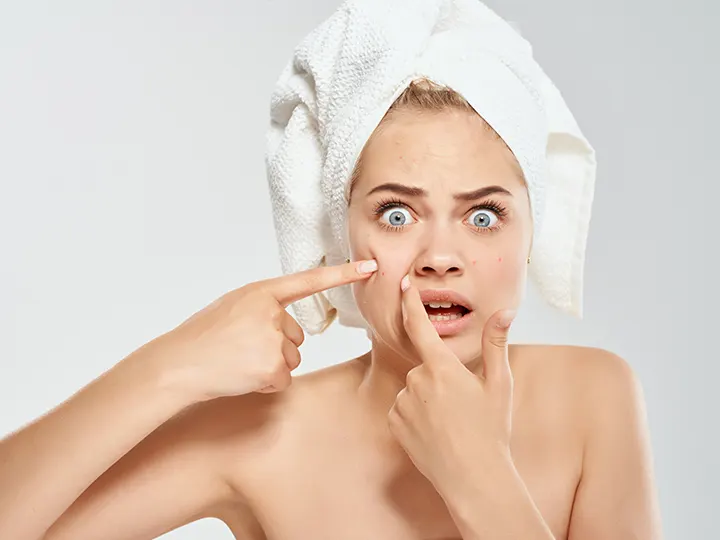
Popping a pimple can lead to a range of results, some of which may be positive, while others can be negative. It is important to understand the potential consequences of popping a pimple before making the decision to do so.
One of the most common reasons people pop pimples is because they want to get rid of them quickly. However, this can be a mistake, as popping a pimple can actually make the condition worse. When a pimple is popped, the skin is punctured, which can cause bacteria and other contaminants to enter the open wound. This can lead to infection, inflammation, and even scarring.
Infection is one of the most common negative consequences of popping a pimple. When the skin is punctured, bacteria can enter the open wound, causing an infection. This can lead to further inflammation, redness, and swelling. In severe cases, the infection can spread to surrounding tissue, causing a more severe skin condition known as cellulitis.
Scarring is another common negative consequence of popping a pimple. When the skin is punctured, it can leave behind a permanent mark known as a scar. Scars can be raised or indented and can be difficult to conceal with makeup. They can also be a source of self-consciousness and low self-esteem.
Popping a pimple can also make the condition worse by spreading the bacteria and oil that cause acne. When a pimple is popped, the contents of the pimple can spread to surrounding hair follicles, causing new pimples to form. This can lead to a cycle of pimple popping, which can make the condition even worse over time.
In addition to the physical consequences of popping a pimple, there can also be psychological consequences. For some people, the act of popping a pimple can be addictive and they may find themselves compulsively popping pimples, even if it makes the condition worse. This can lead to feelings of shame, guilt, and low self-esteem.
While popping a pimple can lead to negative consequences, there are some cases where it may be appropriate. For example, if a pimple is large and painful, it may be necessary to pop it to relieve the pressure and discomfort. In this case, it is important to do so in a safe and hygienic manner to minimize the risk of infection and scarring.
In conclusion, popping a pimple can lead to a range of results, some of which may be positive, while others can be negative. It is important to understand the potential consequences of popping a pimple before making the decision to do so. If you have persistent or severe acne, it is best to consult a dermatologist who can recommend a personalized treatment plan. In most cases, it is best to avoid popping pimples and instead allow the skin to heal naturally. By doing so, you can help reduce the risk of infection, scarring, and other negative consequences.
What happens on the skin when we pop acne?
When you pop a pimple, you are essentially breaking open the skin, which can have several consequences. Here are some of the things that happen to the skin when you pop a pimple:
Introduction of bacteria: When you pop a pimple, you are introducing bacteria from your fingers into the open wound. This can increase the risk of infection and lead to further inflammation and redness.
Increased inflammation: Popping a pimple can also cause increased inflammation, as the skin's natural response to injury is to become red and swollen. This can lead to a larger and more noticeable pimple.
Risk of scarring: Popping a pimple can also increase the risk of scarring, as the skin is more likely to scar when it is injured. The scarring can be permanent and can be difficult to conceal with makeup.
Spread of acne: Popping a pimple can also cause the contents of the pimple to spread to other areas of the skin, leading to new pimples forming.
Delayed healing: Popping a pimple can also delay the healing process, as the skin needs time to heal and repair itself after being punctured. This can lead to a longer and more noticeable pimple.
In conclusion, popping a pimple can have several negative consequences for the skin, including increased inflammation, the introduction of bacteria, the risk of scarring, the spread of acne, and delayed healing. It is generally best to avoid popping pimples and instead allow the skin to heal naturally, or to seek the advice of a dermatologist who can recommend a personalized treatment plan.